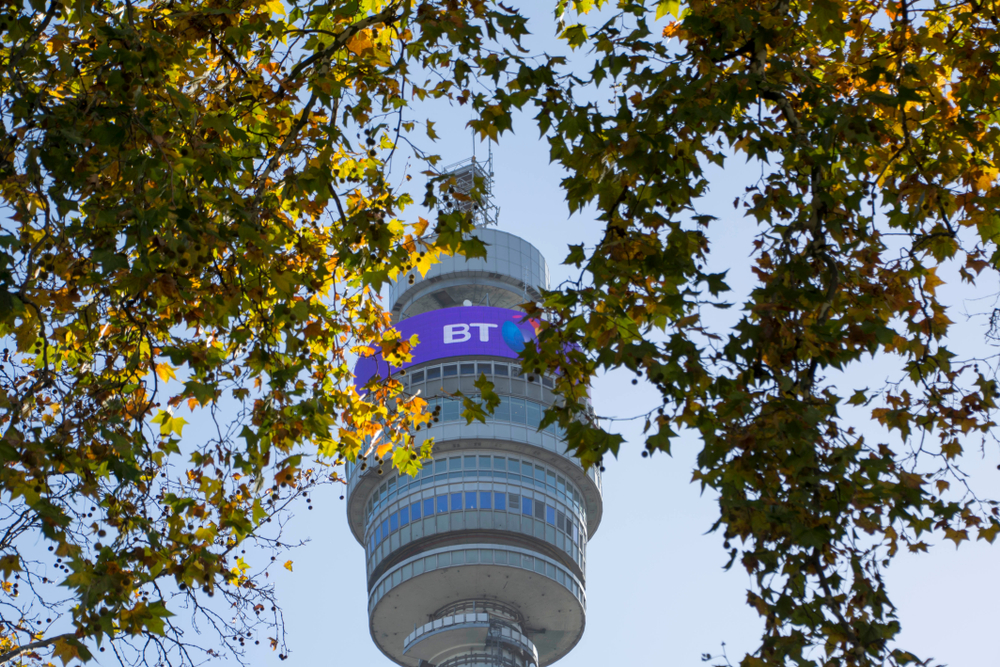On the eve of COP25 climate conference in Madrid, Oliver Balch profiles the head of sustainability at the FTSE 100 company, one of the first to set an ambitious 1.5C science-based target
Amid the hoard of climate-minded policymakers, campaigners, lobbyists and media heading to Madrid next week for the United Nations’ annual climate jamboree will be Gabrielle Ginér. Head of environmental sustainability at the UK telcoms giant BT, Ginér attended her first COP (Conference of the Parties) in Paris in 2015 and has not missed one since.
But she is no conference groupie. A graduate in international economics, Ginér has a long background in public affairs and government relations, including a stint in Brussels prior to joining BT in 1997. In short, she knows that the regulatory process matters.
As with other business attendees (the number of which is increasing year on year), she will be partly in Madrid to fly her company’s flag. Here, she has a head start. The quality of BT’s customer service may invite questions, but its record for climate leadership is up there with the best.
What we are trying to do at COP is to show best practice. A lot of policymakers are not aware of what businesses are already doing
In faintly accented English (she is Swedish by birth), Ginér runs off a lengthy list of BT’s recent achievements: an 80% reduction in carbon emissions from its own operations (and scope 2) since 1996; a more than doubling of renewable energy consumption since 2004, to 87% of all its electricity needs today; savings of £298m in energy efficiency measures over the last decade.
As she explains: “What we are trying to do at COP . . . is to show best practice and what we are doing. A lot of policymakers are not aware of what businesses are already doing.”
Don’t expect any grandstanding from Ginér, however. Swaggering isn’t her style. Nor is it really BT’s. The national brand, which recently rebranded to reflect that is is no longer just about telecoms and broadband, is keeping a low-ish profile in Madrid. So no high-level sponsorships or boozy side events.

Generally, it is the corridors of COP where Ginér wears down her shoes, not on the main stage. A strategic conversation here, a confidential chat there. That said, at a UN climate meeting in Bonn in May 2018, she briefly addressed the conference’s official delegates. The invitation arose from her involvement in the Talanoa Dialogue, a year-long process aimed at including the voices of non-state actors.
How she used the three minutes allocated to her in Bonn reveals much about her strategy for making a difference and driving change, particularly at a political level.
First up, she was dead straight about BT’s motivations. For this £5.5bn FTSE 100 company, tackling climate change is as much about business growth as it is the wellbeing of the planet, she told the packed conference hall.
People who work in this space realise that climate change is a shared problem . . . No one has all the answers, but we are trying to get there by talking
Ginér drew attention to the fact that BT’s carbon-saving products (teleconferencing, broadband, cloud networking, and so on) now makes up nearly one quarter (23.4%) of the company’s entire revenues. In terms of hard, cold cash, BT netted £220m in energy savings between 2009 and 2016 (the figure has since increased to £298m). As she stated at the time: “The business case for climate action is clear.”
Second, the speech demonstrated Ginér’s deep conviction about the importance of cooperation. Today, BT occupies a leading role in a host of business-led climate coalitions, from We Mean Business and The Climate Group through to CDP (formerly, the Carbon Disclosure Programme) and the World Business Council for Sustainable Development.
Such organisations represent “safe spaces” for businesses, where corporate professionals can talk through shared challenges in a frank and open fashion, she observes: “People who work in this space realise that [climate change] is a shared problem . . . No one has all the answers, but we are trying to get there by talking.”

In addition, Ginér praises a collaborative approach to climate change action for its “snowball effect”, which prompts climate laggards to get on board and climate leaders to “raise the bar”.
It is for this reason that Ginér took the highly unusual decision to publish the methodologies behind BT’s science-based climate targets.
Asked if she isn’t concerned that others might simply lift wholesale the methodological insights that BT worked for months to develop with the Climate Trust, she responds with genuine equanimity. The more that do so, the better, she believes. Indeed, a fundamental aspect of her role at BT is to inspire other companies to embrace climate action, she says.
“For me personally, I hope to get ‘takers’ … When other companies, including some of our competitors, started talking about their abatement targets, to me that was great. That’s exactly what we wanted.”
In 2012, BT introduced its Better Future Supplier Forum to win over its 18,000 suppliers
When it comes to winning buy-in from others, BT has form. In 2012, the telecoms giant introduced its award-winning Better Future Supplier Forum in a bid to win over its supply base. BT’s 18,000 suppliers are responsible for more than 60% of its end-to-end emissions, a figure the firm (which boasts a procurement budget of around £14bn per year) hopes to cut by 29% by 2030.
As part of the initiative, suppliers are helped to assess their carbon footprint as well as trained up on emissions-reduction techniques. BT’s strategy here is a mix of carrots and sticks. On the one hand, suppliers can access favourable prices for renewable energy courtesy of a deal between BT and energy provider Npower. On the other, an update to their contract means that they are now obliged to make progress on cutting their emissions while working with BT.
The third, and perhaps most important characteristic exhibited by Ginér in her one-off COP speech, is a willingness to stick her own neck out. Thanks in no small part to her personal leadership, BT became the third multinational company to come out with a science-based target in line with keeping temperature to the more ambitious 1.5C (just pipped to the post by Carlsberg and Tesco, which were also advised by Carbon Trust). Until then other companies had adopted 2C compatible emissions targets.

She says she came away from the Paris Climate Summit in 2015 realising that it was only by setting a 1.5C science-based target that BT could rise to the ambition of the Paris Agreement.
Executing that idea was no easy task. First, BT’s own board needed convincing. While supportive in principle, the combination of a seemingly futuristic 2030 horizon and a lack of clarity about potential costs left them understandably unnerved. Remember, this was also pre-Extinction Rebellion and Greta Thunberg, Ginér notes, so today’s “public mood music” around the climate emergency was yet to be felt.
Ginér did her level best to provide hard numbers where possible, but, with so many unanswered (and unanswerable) variables on the table, landing on a concrete figure was always going to be “impossible”. Take electric cars. To hit a 1.5C pathway, BT will need to shift its entire fleet of 33,000 vehicles to electric or a low-carbon equivalent. With EVs only just entering the mainstream now, how much such a move will cost is anyone’s guess.
All corporate boards now notice that the discussion on climate change has taken off . . . and setting science-based targets is simply what we need to do
In the end, Ginér found the most convincing route was to draw on BT’s own history of leadership. Way back in 1992, for example, the company’s then executive board became one of the first in UK corporate history to agree a voluntary emissions reduction target. Her message was simple: BT had stuck its neck out before and could (read: should) do so again.
Two years on, with climate change now front and centre in the public mind, Ginér’s instinct is more than validated. From being a lone few just a couple of years ago, 22 corporations now have approved science-based targets in line with a 1.5C pathway. An additional 222 have approved targets using a temperature rise of within 2C as their yardstick. Another 441 companies have set SBTs, but have not yet had their plans approved.
As Ginér observes: “All corporate boards now notice that the discussion on climate change has taken off and there’s a recognition that for BT and companies like us this [setting science-based targets] is simply what we need to do.”
For Ginér, showing bold leadership in this space has knock-on effects beyond BT’s own immediate carbon footprint. The term she uses to define such effects is “ambition loops”, by which she means a sort of positive, upward spiral whereby corporate commitments and public policy begin to mutually reinforce one another.

“When we see policymakers starting to talk similarly about 1.5 degrees and net zero, that becomes very helpful for me to go back to my board and say, ‘Look what’s happening, the government is talking about this as well’. And the government can also say, ‘Look at big companies like BT and Unilever, they are also all talking about net-zero’.”
This is a refreshing change, when all too often the intent of corporate lobbyists is to dampen and delay progressive policy. Never has this been truer than in policy debate on climate change, whether it be opposition to specific measures like a mandatory carbon tax, or general antipathy towards wider policy initiatives like the US Democrats’ proposed Green New Deal.
And climate sceptics don’t only exist in business; policymakers also have their own internal battles to fight. So when big brands come out in support of a policy idea like net-zero emissions by 2050 (as more than 120 companies did in an open letter to the then UK prime-minister Theresa May last May), it carries weight in the corridors of power.
Company representatives heading to Madrid next week should take a leaf from Ginér’s book. The world of climate policy has enough hot air circulating already; what’s needed is more of her brand of quiet, focused, ambitious leadership.
CV: Gabrielle Ginér
2009 – Head of Environmental Sustainability, BT
2009 –
Partnership Director, BT
2007 – 2009
Programme Manager, BT
2000 – 2007
Head of Public Affairs and Regulation, BT Japan
1997 – 2000
Adviser, European Public Policy Advisers
1993 – 1997
Gabrielle Ginér will be one of the speakers at Ethical Corporation’s Responsible Business Summit Europe 2020.
This article is part of our monthly Disruptor series and also featured in our December magazine along with:
How Mindy Lubber is leading the green business fight in Trump’s America
Climate change is the biggest ethical issue the Church of England faces
Lucas Joppa’s mission to use Microsoft’s computational might for good
COP25 supply chain science-based targets Talanoa Dialogue The Climate Group CDP WBCSD Carbon Trust


